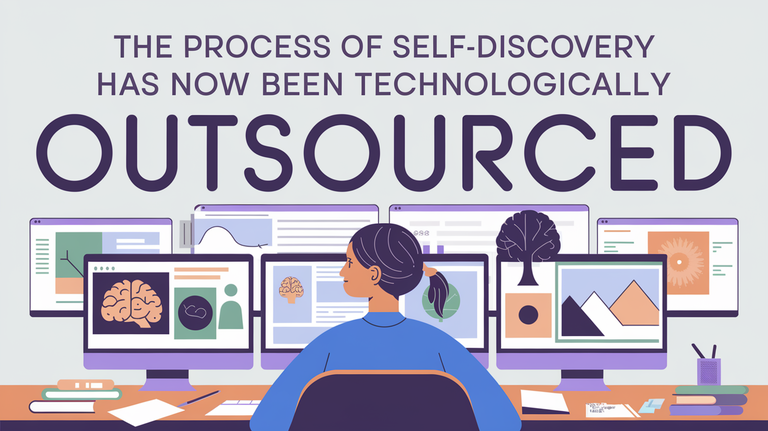In today’s digital age, the process of self-discovery, which was once a deeply personal and introspective journey, has increasingly become dependent on technology. From social media algorithms that track our preferences to personality quizzes and wellness apps that claim to understand us better than we do ourselves, it appears that technology has taken a central role in helping individuals define who they are. While technology provides tools for self-reflection and convenience, it also raises questions about authenticity, privacy, and the depth of self-awareness that can be achieved through artificial means. This essay will explore how the process of self-discovery has been technologically outsourced, its implications, and the balance between human introspection and technological assistance.
Introduction
Self-discovery, traditionally seen as an internal journey of understanding one’s emotions, values, and purpose, is now increasingly shaped by technology. The digital landscape offers countless tools that promise to help people understand themselves better—through personality tests, mental health apps, fitness trackers, and algorithms that curate content based on individual preferences. While technology can aid in this process, there is a growing concern that the deep, reflective nature of self-discovery is being overshadowed by quick, surface-level digital solutions. In this essay, we will examine how technology is reshaping self-discovery and explore both its benefits and potential drawbacks.
The Rise of Technology in Self-Discovery
In recent years, technological advancements have created a vast array of platforms aimed at helping people understand themselves better. From popular personality tests like the Myers-Briggs Type Indicator to wellness apps that track mood and offer personalized mental health advice, people are increasingly turning to technology to gain insights into their personality, behavior, and mental well-being.
Social media platforms like Instagram and TikTok use algorithms that track user behavior, suggesting content that aligns with an individual’s preferences. These algorithms claim to know what users want, shaping their online experience by feeding them curated content. Similarly, fitness trackers and health apps provide users with data on their physical activity, sleep patterns, and even emotional states. With these tools, individuals can collect data on their habits, patterns, and preferences without needing to deeply reflect or analyze their behavior on their own.
Technology also offers quizzes and assessments, such as the “16 Personalities” test or astrological apps like Co-Star, which provide detailed personality profiles based on a series of questions. Many people use these tools to gain a sense of identity and validation, relying on the results to understand who they are. However, while technology offers convenience, it also raises concerns about how much we rely on these digital tools to tell us who we are.
The Convenience of Outsourced Self-Discovery
One of the primary reasons people turn to technology for self-discovery is convenience. Technology makes it easier and faster to gain insights about oneself without the deep introspection traditionally required. Rather than spending months or years journaling, reflecting, or engaging in meditation, people can now use apps and quizzes to get instant feedback on their personality or mental state.
For instance, fitness trackers and sleep monitors provide users with real-time data about their health, offering insights into their habits and well-being that would otherwise be difficult to track. These tools allow people to quickly identify patterns in their behavior and make adjustments to improve their physical and mental health. Similarly, therapy apps and meditation platforms like Headspace or Calm offer structured self-help practices that guide users through mindfulness exercises or stress management techniques. This instant accessibility of resources saves time and effort, making self-discovery more accessible to a broader audience.
However, the question remains: Is convenience a substitute for genuine self-awareness? Technology may provide data and insights, but self-discovery involves more than collecting information. True self-awareness requires deep reflection, emotional processing, and often, difficult personal growth. The danger of outsourcing self-discovery to technology is that individuals may mistake quick answers for profound understanding, limiting their journey to surface-level insights.
The Risks of Algorithmic Influence
Another challenge of relying on technology for self-discovery is the influence of algorithms. Social media platforms and digital tools collect vast amounts of data about users’ behavior, preferences, and interactions. Algorithms then use this data to offer suggestions—whether it’s content recommendations, product advertisements, or connections with others. While these algorithms are designed to create a personalized experience, they can also create echo chambers that limit exposure to diverse perspectives.
For example, a person might follow a few accounts on social media that align with their interests, and soon, the algorithm begins feeding them similar content. Over time, this curated experience can reinforce existing beliefs and preferences, making it harder for individuals to explore new ideas or challenge their self-perception. This creates a feedback loop where individuals are shown only what they are comfortable with, rather than being exposed to content that might push them toward deeper self-exploration or personal growth.
Moreover, many of these platforms are driven by commercial interests, meaning that the insights and recommendations offered are not necessarily neutral. Tech companies may use data to promote products or services that align with user behavior, subtly shaping their preferences and choices. This raises the question: To what extent is our process of self-discovery being manipulated by technology for profit?
The Loss of Authenticity
One of the more concerning aspects of technologically outsourcing self-discovery is the potential loss of authenticity. True self-discovery involves confronting both the positive and negative aspects of oneself. It requires vulnerability, honesty, and the willingness to face uncomfortable truths. However, when we rely on technology to tell us who we are, there is a risk that we may gravitate towards simplified or idealized versions of ourselves.
For example, personality tests often offer flattering descriptions or affirmations, making individuals feel validated in their existing behaviors rather than encouraging them to change or grow. Apps that provide daily motivational quotes or horoscopes offer a sense of connection or understanding, but they rarely address the complexities of human identity. When we turn to technology for self-validation, we may be bypassing the more challenging aspects of self-discovery that involve growth, change, and sometimes, discomfort.
Additionally, people tend to curate their online personas, presenting only the most desirable aspects of their lives. Social media platforms, for instance, are filled with carefully selected images and moments that reflect an idealized version of a person’s identity. This can create a disconnect between how individuals present themselves online and who they truly are. Over time, this curation may lead individuals to lose touch with their authentic selves, as they become more focused on maintaining a certain image rather than engaging in genuine self-reflection.
Balancing Technology and True Self-Discovery
While technology can be a helpful tool in the process of self-discovery, it is important to balance its use with traditional forms of introspection and reflection. Technology can offer valuable data, structure, and convenience, but it should not replace the deeper emotional and psychological work required for true self-awareness.
For example, while fitness trackers can help monitor physical health, they should be complemented by mindful practices like meditation or journaling, which encourage individuals to reflect on their emotional and mental well-being. Similarly, personality quizzes and mental health apps can provide helpful insights, but they should not substitute real-life experiences, personal challenges, and relationships that contribute to self-growth.
Ultimately, self-discovery is a personal and ongoing journey. It cannot be fully outsourced to technology. While digital tools can provide guidance, insights, and structure, true self-awareness comes from engaging with the world, facing challenges, and reflecting on one’s experiences in an authentic and meaningful way.
Conclusion
The process of self-discovery has increasingly been shaped by technological advancements, offering convenience, structure, and data-driven insights. While these tools can support personal growth and reflection, they also come with risks, including the potential for superficial understanding, algorithmic manipulation, and a loss of authenticity. Self-discovery is more than collecting data or following curated content; it is an emotional, introspective process that requires vulnerability and depth.
As we continue to integrate technology into our lives, it is important to strike a balance between using digital tools and engaging in more traditional forms of self-reflection. Technology can enhance self-discovery, but it should not replace the rich, complex process of understanding who we are through personal experience, relationships, and genuine introspection.







